Business Law Assignment: Authority, Silence, and Contracts
VerifiedAdded on 2022/11/23
|6
|1276
|420
Homework Assignment
AI Summary
This business law assignment addresses two key questions. The first explores the legal force of contracts created by agents with apparent authority, defining estoppel and ostensible authority, and citing relevant case law. It explains how apparent authority binds a principal to contracts formed by an agent, even without explicit authorization, particularly in emergency situations. The second question examines the extent to which silence constitutes misleading or deceptive conduct under Section 18 of the Australian Consumer Law (ACL), focusing on the absence of a general obligation to disclose material information in commercial negotiations. It analyzes the impact of silence on the conduct or decisions of other parties, considering the reasonable expectations of the other party, and cites a relevant case, ACCC v LG Electronics Australia Pty Ltd [2017] FCA 1047, to illustrate how misleading consumers through silence can breach the ACL. The assignment highlights the importance of understanding these legal principles in business contexts, particularly in relation to agency, contracts, and consumer protection.
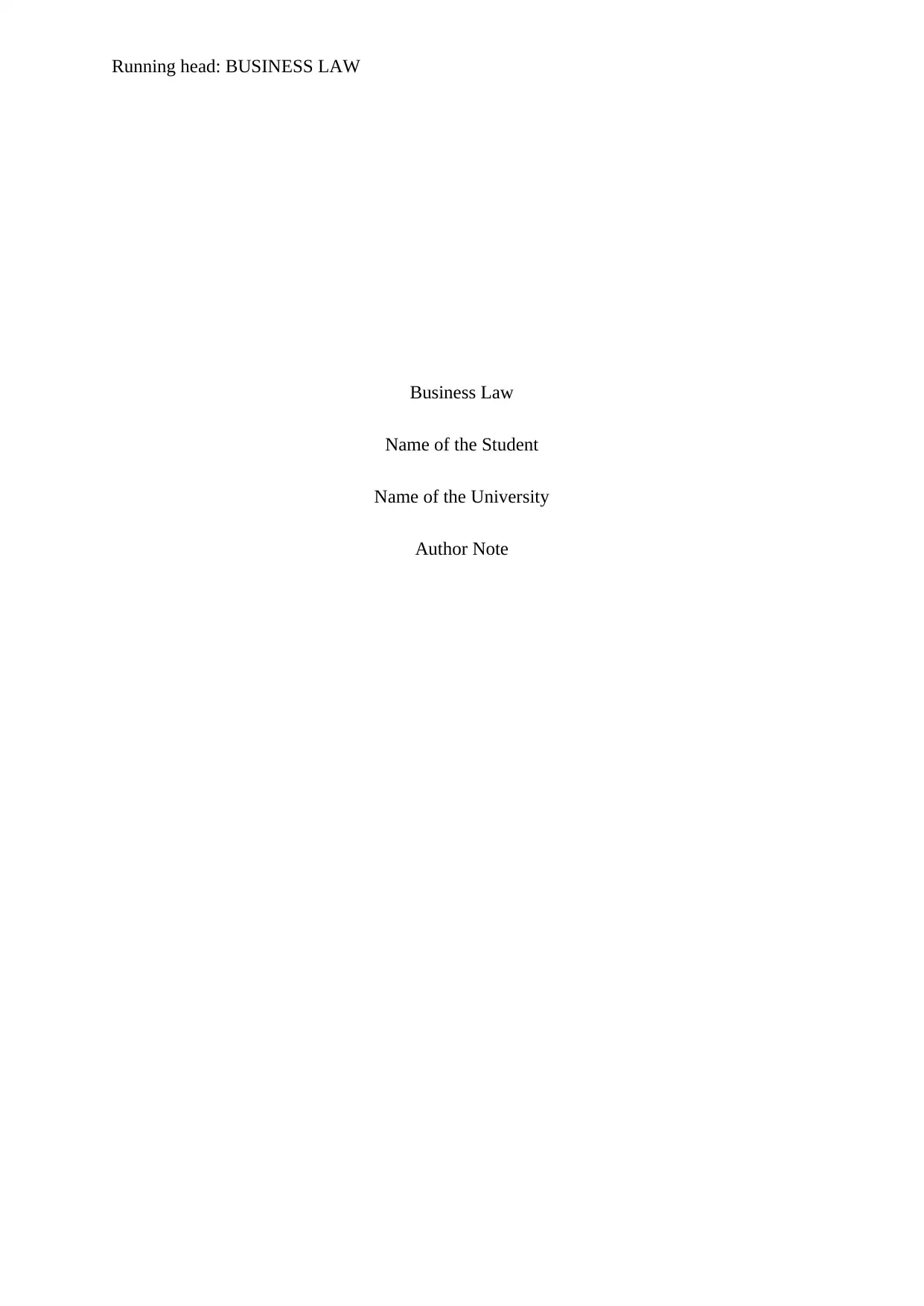
Running head: BUSINESS LAW
Business Law
Name of the Student
Name of the University
Author Note
Business Law
Name of the Student
Name of the University
Author Note
Paraphrase This Document
Need a fresh take? Get an instant paraphrase of this document with our AI Paraphraser
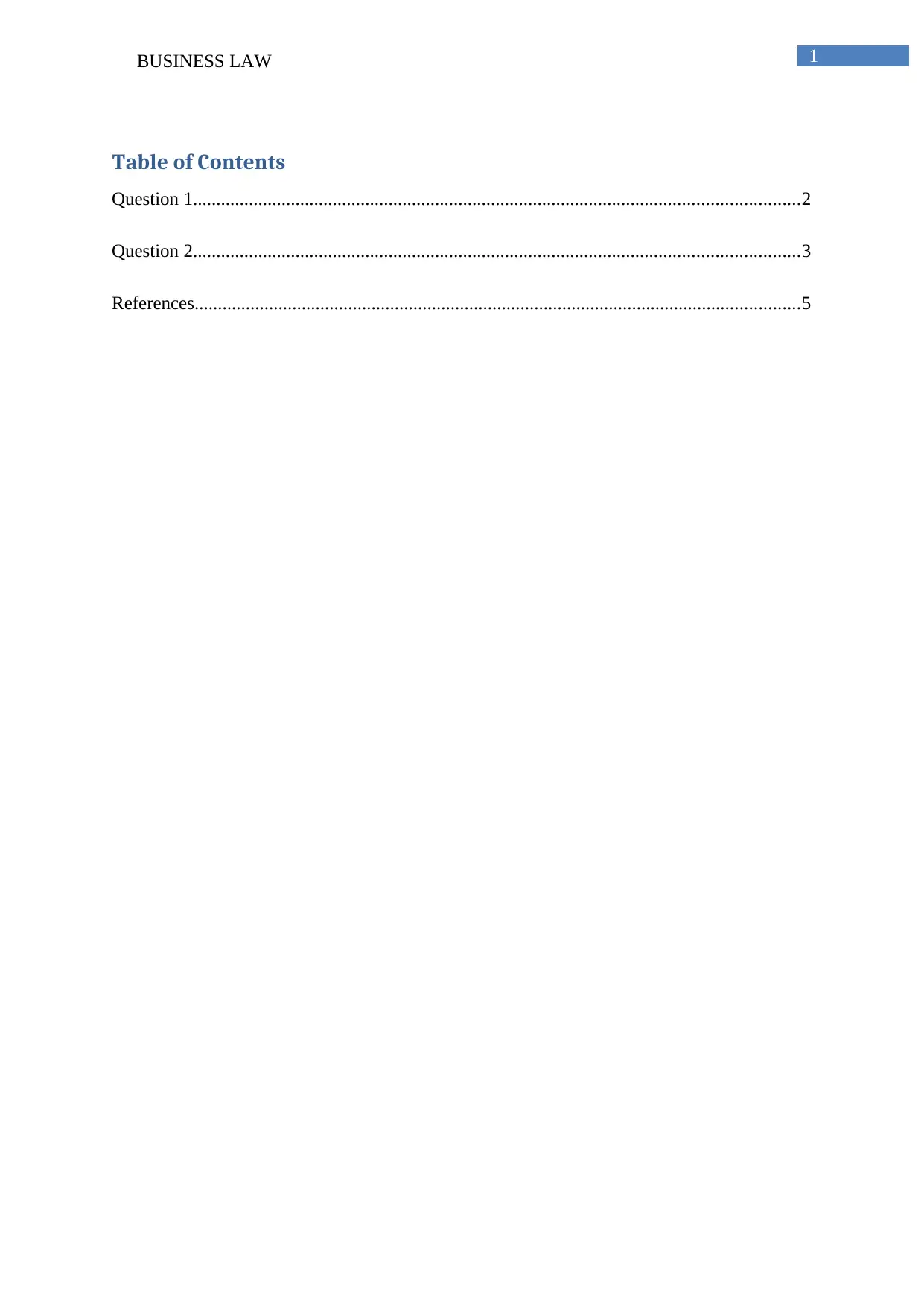
1BUSINESS LAW
Table of Contents
Question 1..................................................................................................................................2
Question 2..................................................................................................................................3
References..................................................................................................................................5
Table of Contents
Question 1..................................................................................................................................2
Question 2..................................................................................................................................3
References..................................................................................................................................5
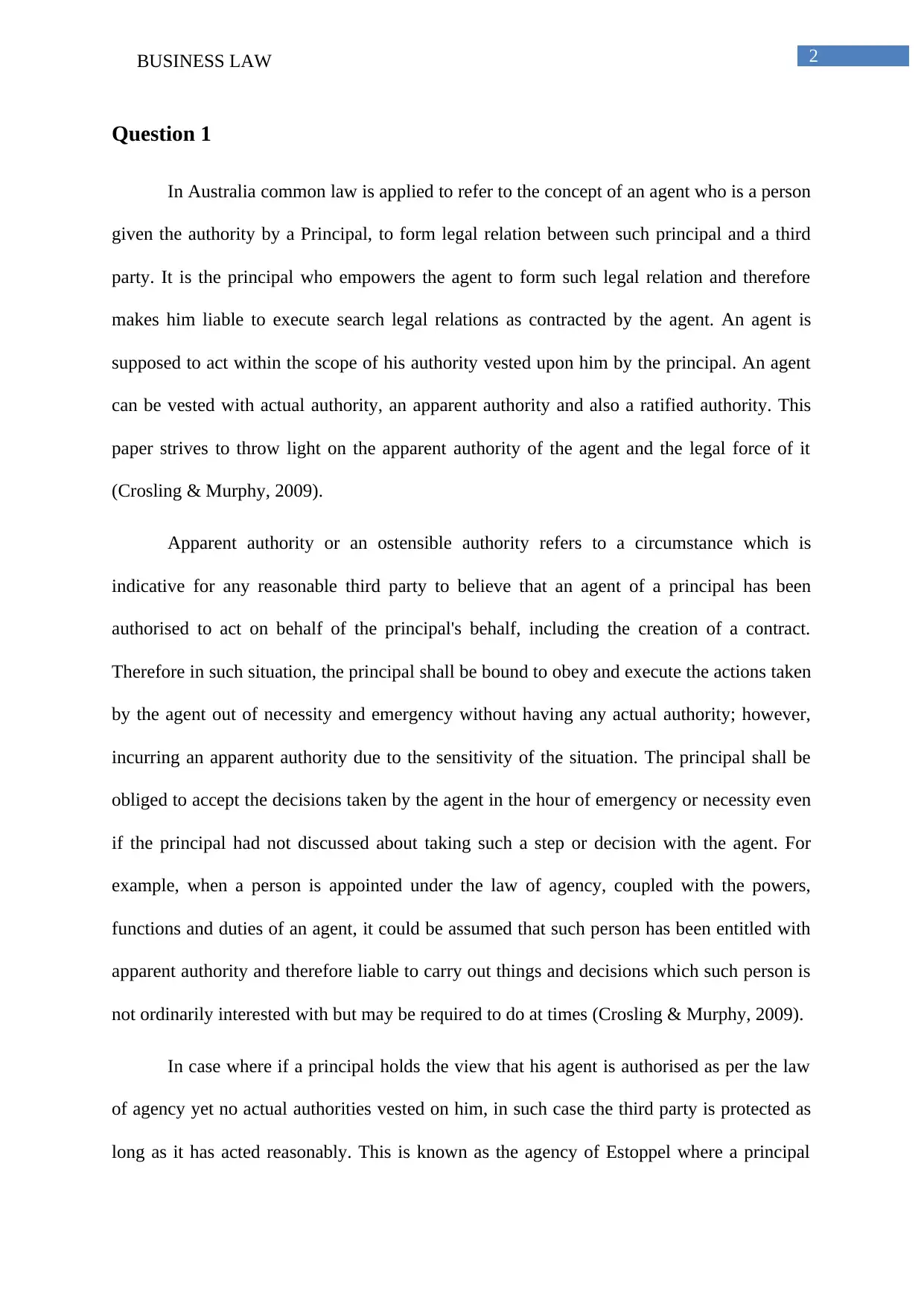
2BUSINESS LAW
Question 1
In Australia common law is applied to refer to the concept of an agent who is a person
given the authority by a Principal, to form legal relation between such principal and a third
party. It is the principal who empowers the agent to form such legal relation and therefore
makes him liable to execute search legal relations as contracted by the agent. An agent is
supposed to act within the scope of his authority vested upon him by the principal. An agent
can be vested with actual authority, an apparent authority and also a ratified authority. This
paper strives to throw light on the apparent authority of the agent and the legal force of it
(Crosling & Murphy, 2009).
Apparent authority or an ostensible authority refers to a circumstance which is
indicative for any reasonable third party to believe that an agent of a principal has been
authorised to act on behalf of the principal's behalf, including the creation of a contract.
Therefore in such situation, the principal shall be bound to obey and execute the actions taken
by the agent out of necessity and emergency without having any actual authority; however,
incurring an apparent authority due to the sensitivity of the situation. The principal shall be
obliged to accept the decisions taken by the agent in the hour of emergency or necessity even
if the principal had not discussed about taking such a step or decision with the agent. For
example, when a person is appointed under the law of agency, coupled with the powers,
functions and duties of an agent, it could be assumed that such person has been entitled with
apparent authority and therefore liable to carry out things and decisions which such person is
not ordinarily interested with but may be required to do at times (Crosling & Murphy, 2009).
In case where if a principal holds the view that his agent is authorised as per the law
of agency yet no actual authorities vested on him, in such case the third party is protected as
long as it has acted reasonably. This is known as the agency of Estoppel where a principal
Question 1
In Australia common law is applied to refer to the concept of an agent who is a person
given the authority by a Principal, to form legal relation between such principal and a third
party. It is the principal who empowers the agent to form such legal relation and therefore
makes him liable to execute search legal relations as contracted by the agent. An agent is
supposed to act within the scope of his authority vested upon him by the principal. An agent
can be vested with actual authority, an apparent authority and also a ratified authority. This
paper strives to throw light on the apparent authority of the agent and the legal force of it
(Crosling & Murphy, 2009).
Apparent authority or an ostensible authority refers to a circumstance which is
indicative for any reasonable third party to believe that an agent of a principal has been
authorised to act on behalf of the principal's behalf, including the creation of a contract.
Therefore in such situation, the principal shall be bound to obey and execute the actions taken
by the agent out of necessity and emergency without having any actual authority; however,
incurring an apparent authority due to the sensitivity of the situation. The principal shall be
obliged to accept the decisions taken by the agent in the hour of emergency or necessity even
if the principal had not discussed about taking such a step or decision with the agent. For
example, when a person is appointed under the law of agency, coupled with the powers,
functions and duties of an agent, it could be assumed that such person has been entitled with
apparent authority and therefore liable to carry out things and decisions which such person is
not ordinarily interested with but may be required to do at times (Crosling & Murphy, 2009).
In case where if a principal holds the view that his agent is authorised as per the law
of agency yet no actual authorities vested on him, in such case the third party is protected as
long as it has acted reasonably. This is known as the agency of Estoppel where a principal
⊘ This is a preview!⊘
Do you want full access?
Subscribe today to unlock all pages.

Trusted by 1+ million students worldwide
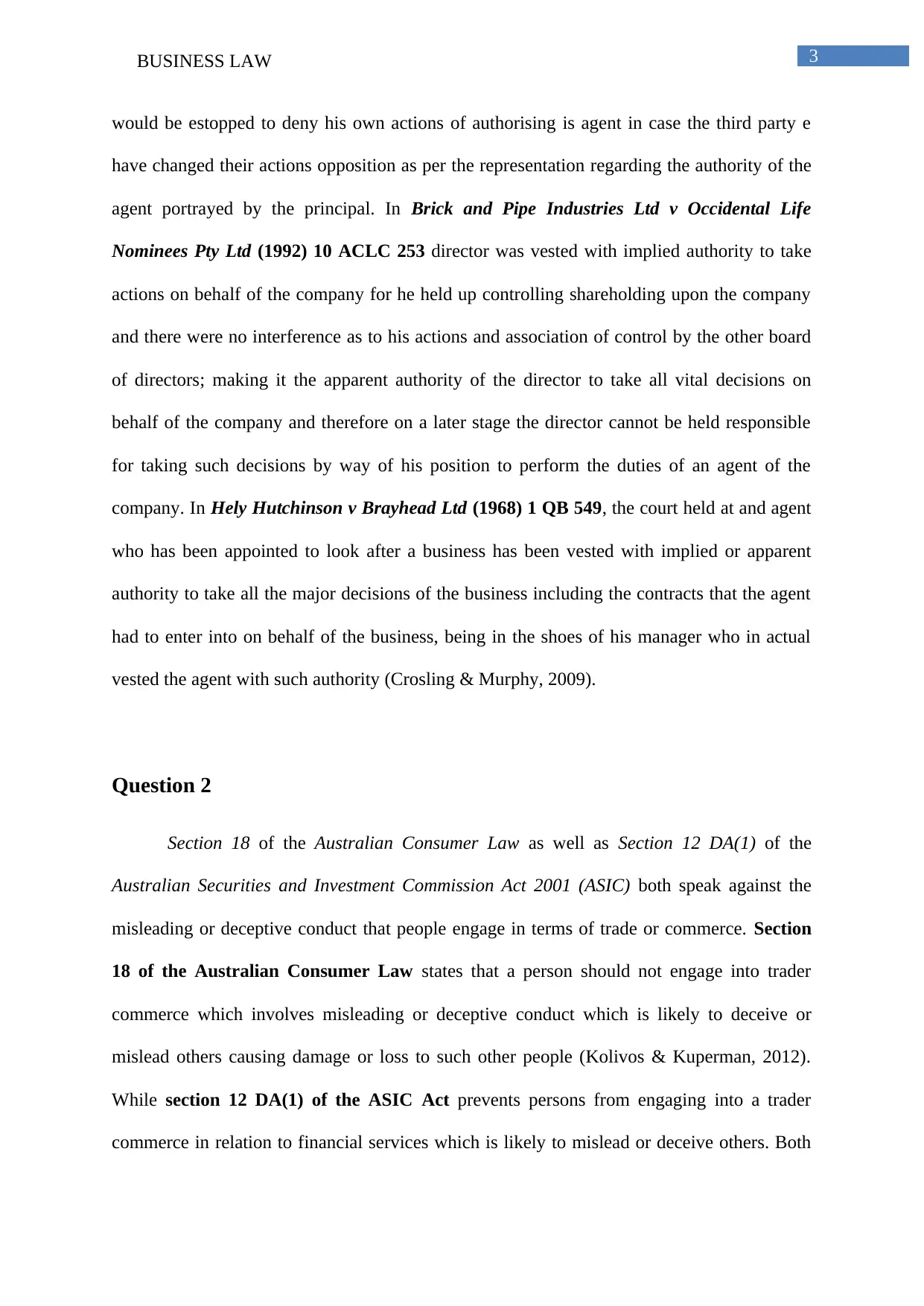
3BUSINESS LAW
would be estopped to deny his own actions of authorising is agent in case the third party e
have changed their actions opposition as per the representation regarding the authority of the
agent portrayed by the principal. In Brick and Pipe Industries Ltd v Occidental Life
Nominees Pty Ltd (1992) 10 ACLC 253 director was vested with implied authority to take
actions on behalf of the company for he held up controlling shareholding upon the company
and there were no interference as to his actions and association of control by the other board
of directors; making it the apparent authority of the director to take all vital decisions on
behalf of the company and therefore on a later stage the director cannot be held responsible
for taking such decisions by way of his position to perform the duties of an agent of the
company. In Hely Hutchinson v Brayhead Ltd (1968) 1 QB 549, the court held at and agent
who has been appointed to look after a business has been vested with implied or apparent
authority to take all the major decisions of the business including the contracts that the agent
had to enter into on behalf of the business, being in the shoes of his manager who in actual
vested the agent with such authority (Crosling & Murphy, 2009).
Question 2
Section 18 of the Australian Consumer Law as well as Section 12 DA(1) of the
Australian Securities and Investment Commission Act 2001 (ASIC) both speak against the
misleading or deceptive conduct that people engage in terms of trade or commerce. Section
18 of the Australian Consumer Law states that a person should not engage into trader
commerce which involves misleading or deceptive conduct which is likely to deceive or
mislead others causing damage or loss to such other people (Kolivos & Kuperman, 2012).
While section 12 DA(1) of the ASIC Act prevents persons from engaging into a trader
commerce in relation to financial services which is likely to mislead or deceive others. Both
would be estopped to deny his own actions of authorising is agent in case the third party e
have changed their actions opposition as per the representation regarding the authority of the
agent portrayed by the principal. In Brick and Pipe Industries Ltd v Occidental Life
Nominees Pty Ltd (1992) 10 ACLC 253 director was vested with implied authority to take
actions on behalf of the company for he held up controlling shareholding upon the company
and there were no interference as to his actions and association of control by the other board
of directors; making it the apparent authority of the director to take all vital decisions on
behalf of the company and therefore on a later stage the director cannot be held responsible
for taking such decisions by way of his position to perform the duties of an agent of the
company. In Hely Hutchinson v Brayhead Ltd (1968) 1 QB 549, the court held at and agent
who has been appointed to look after a business has been vested with implied or apparent
authority to take all the major decisions of the business including the contracts that the agent
had to enter into on behalf of the business, being in the shoes of his manager who in actual
vested the agent with such authority (Crosling & Murphy, 2009).
Question 2
Section 18 of the Australian Consumer Law as well as Section 12 DA(1) of the
Australian Securities and Investment Commission Act 2001 (ASIC) both speak against the
misleading or deceptive conduct that people engage in terms of trade or commerce. Section
18 of the Australian Consumer Law states that a person should not engage into trader
commerce which involves misleading or deceptive conduct which is likely to deceive or
mislead others causing damage or loss to such other people (Kolivos & Kuperman, 2012).
While section 12 DA(1) of the ASIC Act prevents persons from engaging into a trader
commerce in relation to financial services which is likely to mislead or deceive others. Both
Paraphrase This Document
Need a fresh take? Get an instant paraphrase of this document with our AI Paraphraser
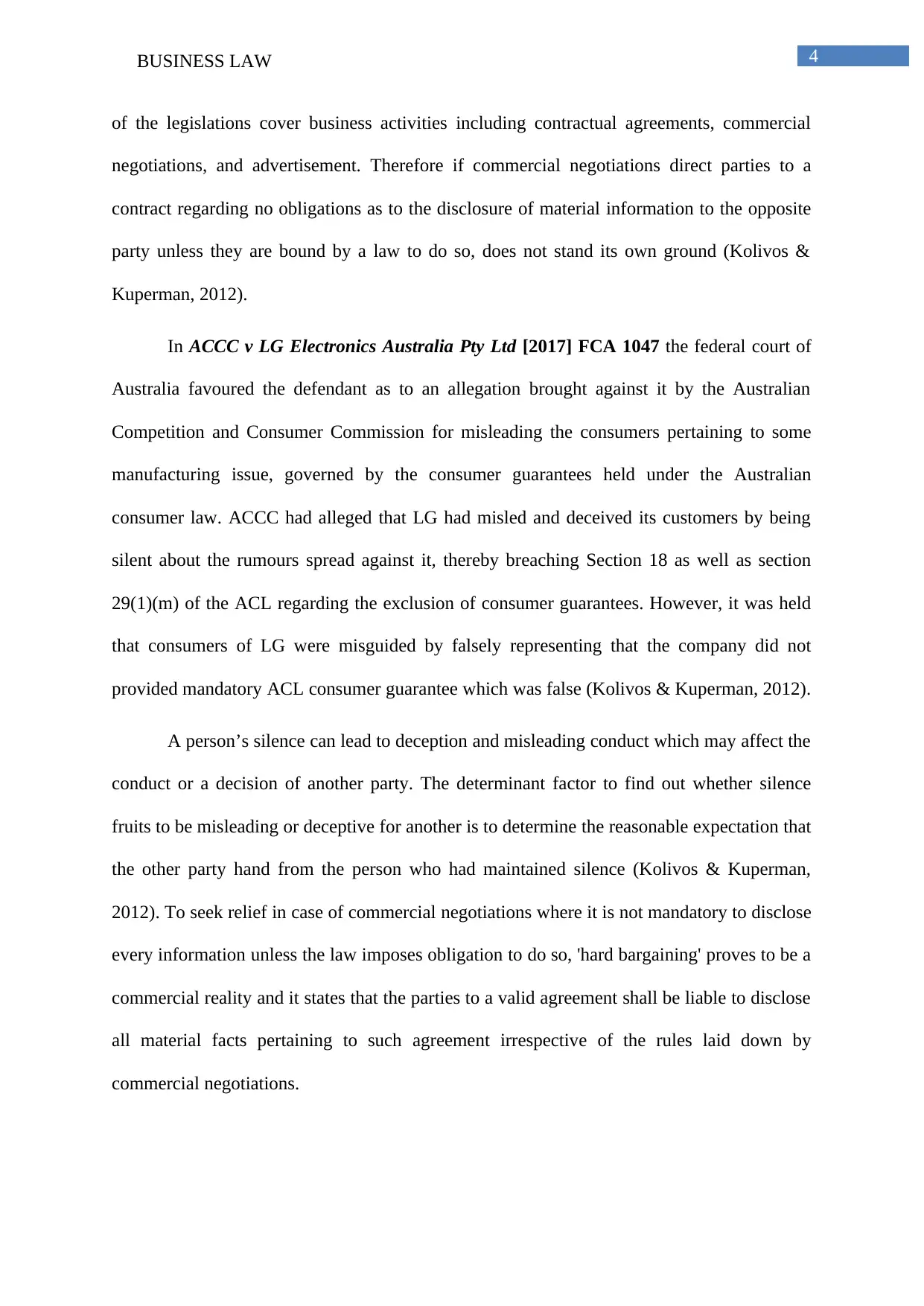
4BUSINESS LAW
of the legislations cover business activities including contractual agreements, commercial
negotiations, and advertisement. Therefore if commercial negotiations direct parties to a
contract regarding no obligations as to the disclosure of material information to the opposite
party unless they are bound by a law to do so, does not stand its own ground (Kolivos &
Kuperman, 2012).
In ACCC v LG Electronics Australia Pty Ltd [2017] FCA 1047 the federal court of
Australia favoured the defendant as to an allegation brought against it by the Australian
Competition and Consumer Commission for misleading the consumers pertaining to some
manufacturing issue, governed by the consumer guarantees held under the Australian
consumer law. ACCC had alleged that LG had misled and deceived its customers by being
silent about the rumours spread against it, thereby breaching Section 18 as well as section
29(1)(m) of the ACL regarding the exclusion of consumer guarantees. However, it was held
that consumers of LG were misguided by falsely representing that the company did not
provided mandatory ACL consumer guarantee which was false (Kolivos & Kuperman, 2012).
A person’s silence can lead to deception and misleading conduct which may affect the
conduct or a decision of another party. The determinant factor to find out whether silence
fruits to be misleading or deceptive for another is to determine the reasonable expectation that
the other party hand from the person who had maintained silence (Kolivos & Kuperman,
2012). To seek relief in case of commercial negotiations where it is not mandatory to disclose
every information unless the law imposes obligation to do so, 'hard bargaining' proves to be a
commercial reality and it states that the parties to a valid agreement shall be liable to disclose
all material facts pertaining to such agreement irrespective of the rules laid down by
commercial negotiations.
of the legislations cover business activities including contractual agreements, commercial
negotiations, and advertisement. Therefore if commercial negotiations direct parties to a
contract regarding no obligations as to the disclosure of material information to the opposite
party unless they are bound by a law to do so, does not stand its own ground (Kolivos &
Kuperman, 2012).
In ACCC v LG Electronics Australia Pty Ltd [2017] FCA 1047 the federal court of
Australia favoured the defendant as to an allegation brought against it by the Australian
Competition and Consumer Commission for misleading the consumers pertaining to some
manufacturing issue, governed by the consumer guarantees held under the Australian
consumer law. ACCC had alleged that LG had misled and deceived its customers by being
silent about the rumours spread against it, thereby breaching Section 18 as well as section
29(1)(m) of the ACL regarding the exclusion of consumer guarantees. However, it was held
that consumers of LG were misguided by falsely representing that the company did not
provided mandatory ACL consumer guarantee which was false (Kolivos & Kuperman, 2012).
A person’s silence can lead to deception and misleading conduct which may affect the
conduct or a decision of another party. The determinant factor to find out whether silence
fruits to be misleading or deceptive for another is to determine the reasonable expectation that
the other party hand from the person who had maintained silence (Kolivos & Kuperman,
2012). To seek relief in case of commercial negotiations where it is not mandatory to disclose
every information unless the law imposes obligation to do so, 'hard bargaining' proves to be a
commercial reality and it states that the parties to a valid agreement shall be liable to disclose
all material facts pertaining to such agreement irrespective of the rules laid down by
commercial negotiations.
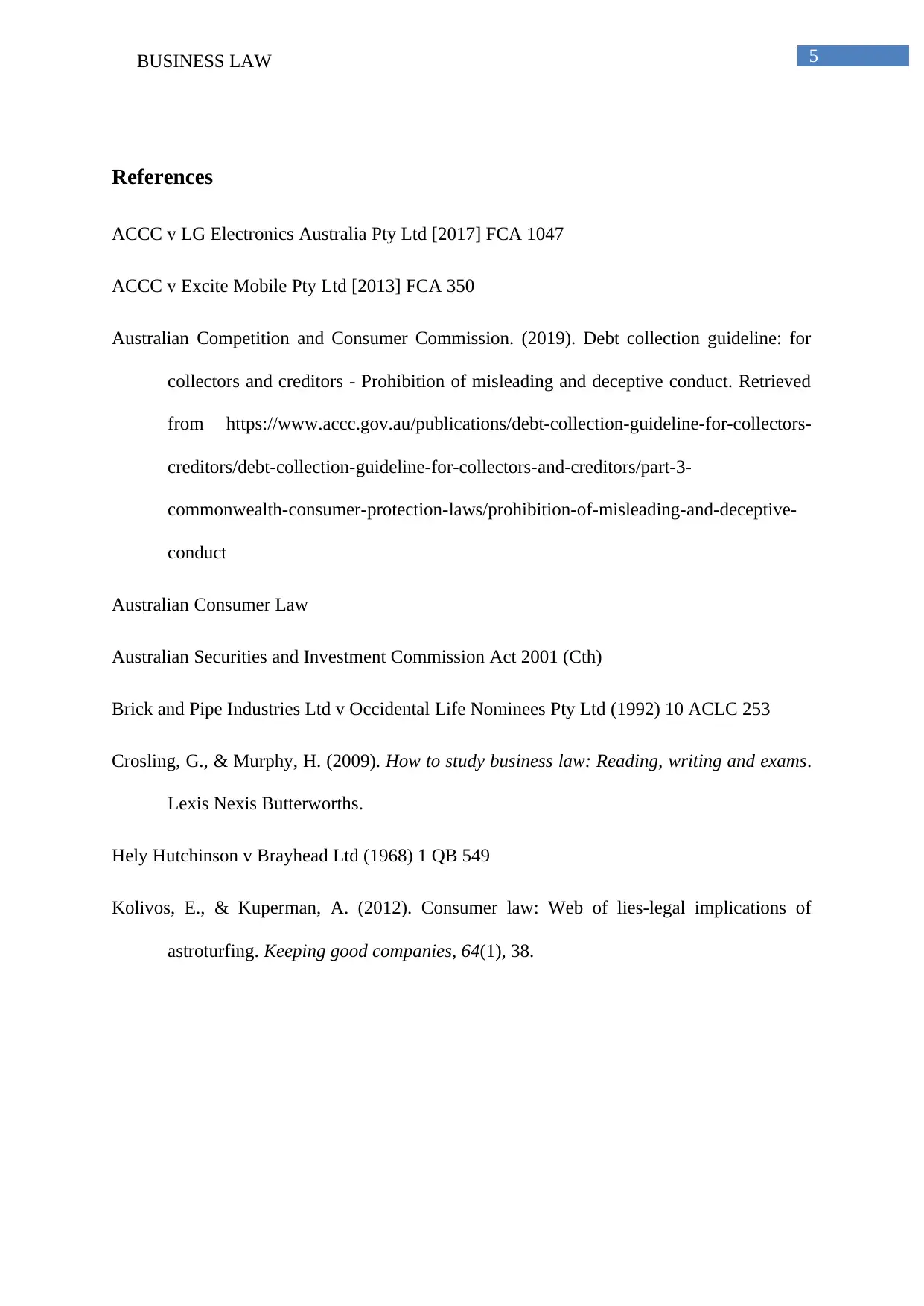
5BUSINESS LAW
References
ACCC v LG Electronics Australia Pty Ltd [2017] FCA 1047
ACCC v Excite Mobile Pty Ltd [2013] FCA 350
Australian Competition and Consumer Commission. (2019). Debt collection guideline: for
collectors and creditors - Prohibition of misleading and deceptive conduct. Retrieved
from https://www.accc.gov.au/publications/debt-collection-guideline-for-collectors-
creditors/debt-collection-guideline-for-collectors-and-creditors/part-3-
commonwealth-consumer-protection-laws/prohibition-of-misleading-and-deceptive-
conduct
Australian Consumer Law
Australian Securities and Investment Commission Act 2001 (Cth)
Brick and Pipe Industries Ltd v Occidental Life Nominees Pty Ltd (1992) 10 ACLC 253
Crosling, G., & Murphy, H. (2009). How to study business law: Reading, writing and exams.
Lexis Nexis Butterworths.
Hely Hutchinson v Brayhead Ltd (1968) 1 QB 549
Kolivos, E., & Kuperman, A. (2012). Consumer law: Web of lies-legal implications of
astroturfing. Keeping good companies, 64(1), 38.
References
ACCC v LG Electronics Australia Pty Ltd [2017] FCA 1047
ACCC v Excite Mobile Pty Ltd [2013] FCA 350
Australian Competition and Consumer Commission. (2019). Debt collection guideline: for
collectors and creditors - Prohibition of misleading and deceptive conduct. Retrieved
from https://www.accc.gov.au/publications/debt-collection-guideline-for-collectors-
creditors/debt-collection-guideline-for-collectors-and-creditors/part-3-
commonwealth-consumer-protection-laws/prohibition-of-misleading-and-deceptive-
conduct
Australian Consumer Law
Australian Securities and Investment Commission Act 2001 (Cth)
Brick and Pipe Industries Ltd v Occidental Life Nominees Pty Ltd (1992) 10 ACLC 253
Crosling, G., & Murphy, H. (2009). How to study business law: Reading, writing and exams.
Lexis Nexis Butterworths.
Hely Hutchinson v Brayhead Ltd (1968) 1 QB 549
Kolivos, E., & Kuperman, A. (2012). Consumer law: Web of lies-legal implications of
astroturfing. Keeping good companies, 64(1), 38.
⊘ This is a preview!⊘
Do you want full access?
Subscribe today to unlock all pages.

Trusted by 1+ million students worldwide
1 out of 6
Related Documents
Your All-in-One AI-Powered Toolkit for Academic Success.
+13062052269
info@desklib.com
Available 24*7 on WhatsApp / Email
![[object Object]](/_next/static/media/star-bottom.7253800d.svg)
Unlock your academic potential
Copyright © 2020–2026 A2Z Services. All Rights Reserved. Developed and managed by ZUCOL.




